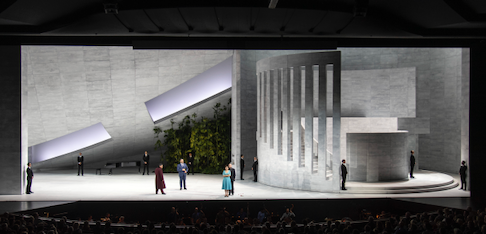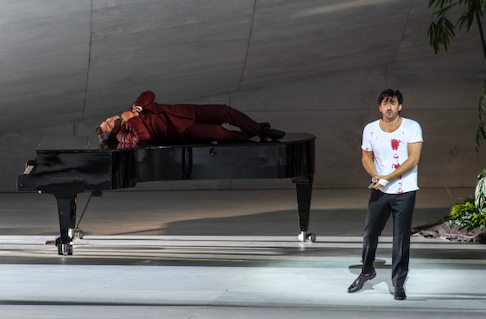Recently in Reviews
English Touring Opera are delighted to announce a season of lyric monodramas to tour nationally from October to December. The season features music for solo singer and piano by Argento, Britten, Tippett and Shostakovich with a bold and inventive approach to making opera during social distancing.
This tenth of ten Live from London concerts was in fact a recorded live performance from California. It was no less enjoyable for that, and it was also uplifting to learn that this wasn’t in fact the ‘last’ LfL event that we will be able to enjoy, courtesy of VOCES8 and their fellow vocal ensembles (more below …).
Ever since Wigmore Hall announced their superb series of autumn concerts, all streamed live and available free of charge, I’d been looking forward to this song recital by Ian Bostridge and Imogen Cooper.
The Sixteen continues its exploration of Henry Purcell’s Welcome Songs for Charles II. As with Robert King’s pioneering Purcell series begun over thirty years ago for Hyperion, Harry Christophers is recording two Welcome Songs per disc.
Although Stile Antico’s programme article for their Live from London recital introduced their selection from the many treasures of the English Renaissance in the context of the theological debates and upheavals of the Tudor and Elizabethan years, their performance was more evocative of private chamber music than of public liturgy.
In February this year, Albanian soprano Ermonela Jaho made a highly lauded debut recital at Wigmore Hall - a concert which both celebrated Opera Rara’s 50th anniversary and honoured the career of the Italian soprano Rosina Storchio (1872-1945), the star of verismo who created the title roles in Leoncavallo’s La bohème and Zazà, Mascagni’s Lodoletta and Puccini’s Madama Butterfly.
Evidently, face masks don’t stifle appreciative “Bravo!”s. And, reducing audience numbers doesn’t lower the volume of such acclamations. For, the audience at Wigmore Hall gave soprano Elizabeth Llewellyn and pianist Simon Lepper a greatly deserved warm reception and hearty response following this lunchtime recital of late-Romantic song.
Collapsology. Or, perhaps we should use the French word ‘Collapsologie’ because this is a transdisciplinary idea pretty much advocated by a series of French theorists - and apparently, mostly French theorists. It in essence focuses on the imminent collapse of modern society and all its layers - a series of escalating crises on a global scale: environmental, economic, geopolitical, governmental; the list is extensive.
For this week’s Live from London vocal recital we moved from the home of VOCES8, St Anne and St Agnes in the City of London, to Kings Place, where The Sixteen - who have been associate artists at the venue for some time - presented a programme of music and words bound together by the theme of ‘reflection’.
'Such is your divine Disposation that both you excellently understand, and royally entertaine the Exercise of Musicke.’
Amongst an avalanche of new Mahler recordings appearing at the moment (Das Lied von der Erde seems to be the most favoured, with three) this 1991 Mahler Second from the 2nd Kassel MahlerFest is one of the more interesting releases.
‘And there was war in heaven: Michael and his angels fought against the dragon; and the dragon fought and his angels, And prevailed not; neither was their place found any more in heaven … that old serpent … Satan, which deceiveth the whole world: he was cast out into the earth, and his angels were cast out with him.’
If there is one myth, it seems believed by some people today, that probably needs shattering it is that post-war recordings or performances of Wagner operas were always of exceptional quality. This 1949 Hamburg Tristan und Isolde is one of those recordings - though quite who is to blame for its many problems takes quite some unearthing.
There was never any doubt that the fifth of the twelve Met Stars Live in Concert broadcasts was going to be a palpably intense and vivid event, as well as a musically stunning and theatrically enervating experience.
‘Love’ was the theme for this Live from London performance by Apollo5. Given the complexity and diversity of that human emotion, and Apollo5’s reputation for versatility and diverse repertoire, ranging from Renaissance choral music to jazz, from contemporary classical works to popular song, it was no surprise that their programme spanned 500 years and several musical styles.
The Academy of St Martin in the Fields have titled their autumn series of eight concerts - which are taking place at 5pm and 7.30pm on two Saturdays each month at their home venue in Trafalgar Square, and being filmed for streaming the following Thursday - ‘re:connect’.
The London Symphony Orchestra opened their Autumn 2020 season with a homage to Oliver Knussen, who died at the age of 66 in July 2018. The programme traced a national musical lineage through the twentieth century, from Britten to Knussen, on to Mark-Anthony Turnage, and entwining the LSO and Rattle too.
With the Live from London digital vocal festival entering the second half of the series, the festival’s host, VOCES8, returned to their home at St Annes and St Agnes in the City of London to present a sequence of ‘Choral Dances’ - vocal music inspired by dance, embracing diverse genres from the Renaissance madrigal to swing jazz.
Just a few unison string wriggles from the opening of Mozart’s overture to Le nozze di Figaro are enough to make any opera-lover perch on the edge of their seat, in excited anticipation of the drama in music to come, so there could be no other curtain-raiser for this Gala Concert at the Royal Opera House, the latest instalment from ‘their House’ to ‘our houses’.
"Before the ending of the day, creator of all things, we pray that, with your accustomed mercy, you may watch over us."
Reviews
![Adorno, Fiesco, Boccanegra, Amelia at Boccanegra's death [All photos copyright Salzburger Festspiele / Ruth Walz]](http://www.operatoday.com/Boccanegra_Salzburg1.png)
18 Aug 2019
Simon Boccanegra in Salzburg
It’s an inescapable reference. Among the myriad "Viva Genova!" tweets the Genovese populace shared celebrating its new doge, the pirate Simon Boccanegra, one stood out — “Make Genoa Great Again!” A hell of a mess ensued for years and years and the drinking water was poisonous as well.
The evening belonged to conductor Valery Gergiev, a gift to him by veteran Berlin Volksbūhne stage director Andreas Kriegenburg and set designer Harald B. Thor who placed a huge black Steinway concert piano as the sole dressing of the huge expanse of white marble that was the stage. The production was indeed not about locale (though in fact the feel was pure Genoese architect Renzo Piano), it was about lyricism.
There was only the piano except for the small black chair in which at the end Simone died and into which fell a confused Adorno as he was proclaimed the city’s new doge. Had it not been brilliant theater it would have been a concert staging.
 The full stage unit set, Amelia in blue front and center
The full stage unit set, Amelia in blue front and center
Much happened in between Boccanegra's election and his death. Moment after moment recalled the great Verdi and presaged his most profound gestures — the indelible tonalities of Traviata, the male bonding in Otello, and most moving of all, the Don Carlo minor second weeping of Fiesco in his duet of reconciliation with the dying Boccanegra.
If no stylistically defining moments emerge from Simon Boccanegra it is not from a lack of splendid arias and duets in moments of extreme duress and of ecstatic resolve. Simon Boccanegra is a sprawling tale of splintered focus, no one character assumes an immensity of theatrical presence — Simone is overwhelmed by affairs of family and of state, the villain Paulo has confused motives, the grandfather Fiesco suffers a complicated history, Adorno appears out of nowhere and Amelia will not be upfront with anyone.
Still there is lots to sing about, maybe too much. Stage director Kriegenburg got the telephones put away early on, costumer Tanja Hofmann gave everyone a discreet identifying color in ordinary contemporary dress and conductor Gergiev took over and made the most of it. Initially we thought maybe we had stumbled into a Boris Godunov —. René Pape’s Fiesco lamented and shamelessly wept like a Russian bass in his famed prayer “Il lacerato spirito.” We did however quickly adjuste to conductor Valery Gergiev’s unidiomatic Italian, his orchestra participating with the singers in moods and colors rather than in Italianate operatic gestures.
Twenty-five years lapse between the prologue and the events that lead to the murder of Boccanegra. The filmy curtain that covered the architecture vanished after the prologue. His daughter Amelia appeared through some sort of silly digital magic that we had to overlook to deliver her luminous “come in quest ora bruna sorridon gli astri e il mare!” Adorno arrived. He sat momentarily at the piano, the harp accompanying his ecstatic greeting that became a love duet. Mo. Gergiev made time stand still in an absolute lyricism of young love.
Gergiev made the lyricism of Verdi’s Boccanegra the central focus of "his" production, insisting that we feel each of Verdi’s characters. And that we did in its arias and duets — the warmth of the love of Boccanegra for his daughter, the loyalty of Amelia for her father, the selfish, ugly rage of Paolo, the jealousy that consumed Adorno and dissolved into desperate need. Above all else we felt Boccanegra’s dying cry to the sea.
The senators, the conspirators and the populace were dressed in undifferentiated dark color. They were construed graphically on the marble expanse of the stage, a part of which was a monumental circular structure that moved of and within itself. This complex mechanism served as a metaphor of the size, power and pride of a city that has.called itself “la Superba,” and against which the actors of this civic and familial tragedy reacted. It was an evening of lyrical moments laid gloriously bare by conductor Gergiev and a splendid cast of singers.
 The piano as a tomb (the first, failed poisoning of Boccanegra), with Adorno
The piano as a tomb (the first, failed poisoning of Boccanegra), with Adorno
In keeping with the scope of the production Italian baritone Luca Salsi was a very feeling father and a sensitive patriot and statesman in warm and strong voice. Latvian soprano Marina Rebeka has the purity of voice to project the innocence of Amelia and the strength of voice to support her resolve. German bass René Pape found satisfying resonance of voice to meld patrician pride with surprising personal integrity. American tenor Charles Castronovo offered a perfectly sculpted Adorno that gave young Gabriele convincing sincerity as a lover and as a rebel. French baritone André Heyboer as Paolo poisoned the water drunk by Boccanegra with the evil resolve of a despicable baritone, assisted by bass Antonio Di Matteo as Pietro.
Simon Boccanegra was performed in the 2200 seat Grosses Festspielhaus, its vast proscenium width allowing both the monumental tower and a vast slit through which a brilliant blue sea shone at Boccanegra’s death. Completing the exemplary artistic resources employed for this production was the Vienna Philharmonic.
Michael Milenski
Production information:
The Vienna Philharmonic, the Summer Academy of the Vienna Philharmonic (stage band), the Concert Choir of the Vienna Staatsoper. Conductor: Vallery Gergiev; Stage Director: Andreas Kriegenburg; Set Design: Harald B. Thor; Costumes: Tanja Hofmann; Lighting: Andreas Grüter; Video: Peter Venus; Dramaturg: Julia Weinreich. Grosses Festspielhaus, Salzburger Festspiele, August 15, 2019 (first of six performances).
![Adorno, Fiesco, Boccanegra, Amelia at Boccanegra's death [All photos copyright Salzburger Festspiele / Ruth Walz]](http://www.operatoday.com/Boccanegra_Salzburg1.png)

